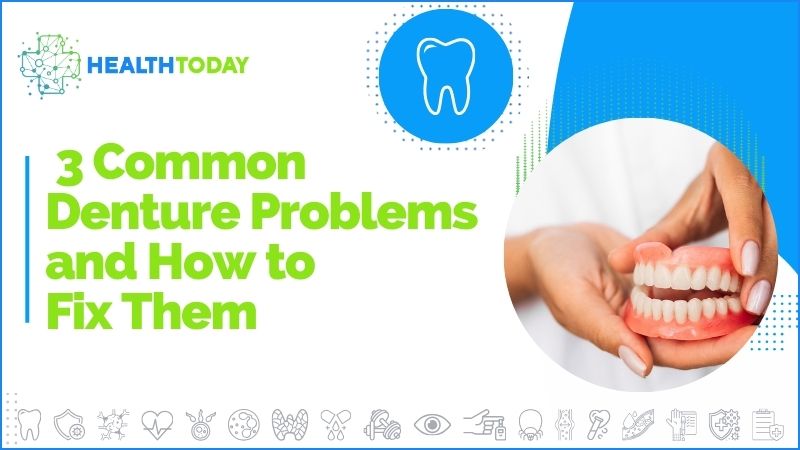
Dentures are essential for many in Calgary, but they can present challenges. This blog by Health Today identifies three common denture problems: sore spots and irritation, difficulty chewing, and slipping or shifting. Sore spots often result from ill-fitting dentures, which can be addressed by regular adjustments and proper cleaning. Difficulty chewing can be eased by starting with soft foods, cutting food into smaller pieces, and chewing evenly. Slipping and shifting dentures can be stabilized with high-quality adhesives or considering implant-supported options. Regular dental check-ups and maintaining good denture care practices are crucial for comfort and functionality. For any denture-related issues, call Health Today - we offer professional support and solutions to ensure a comfortable, confident smile.
Dentures play a vital role in restoring smiles and improving the quality of life for many people in Calgary. However, like any dental appliance, dentures can come with their own set of challenges. At Health Today, we understand that dealing with denture problems can be frustrating and uncomfortable. In this blog, we’ll discuss three common denture problems and provide practical solutions to help you maintain a comfortable and confident smile.
Dentures are a popular and effective solution for replacing missing teeth, allowing individuals to eat, speak, and smile with confidence. Despite their benefits, denture wearers can sometimes encounter issues that affect their comfort and functionality. Recognizing these problems early and knowing how to address them can make a significant difference in your overall denture experience. Here are three common denture problems and how to fix them.
One of the most common issues denture wearers face is the development of sore spots and irritation in the mouth. This discomfort is often caused by dentures rubbing against the gums or other soft tissues, leading to redness, pain, and even ulcers.
How to Fix It:
To alleviate sore spots, it’s essential to ensure that your dentures fit properly. Regular visits to your denturist for adjustments can help achieve a better fit. Over-the-counter dental adhesives can also provide additional stability, reducing movement and friction. Additionally, keeping your dentures clean and soaking them overnight in a denture cleaning solution can help minimize irritation. If the problem persists, consult your denturist for a thorough evaluation and possible relining of your dentures.
Practical Tips:
Adjusting to eating with dentures can be challenging, especially when it comes to certain foods. Many denture wearers struggle with chewing and biting, leading to frustration and a limited diet.
How to Fix It:
Start with soft foods and gradually reintroduce more challenging items as you become more comfortable with your dentures. Cutting food into smaller pieces and chewing slowly can help make eating easier. Using both sides of your mouth to chew evenly distributes the pressure, preventing dentures from tipping. If you continue to experience difficulty, your denturist can offer guidance and suggest denture-friendly dietary adjustments.
Practical Tips:
Dentures that slip or shift out of place can be embarrassing and uncomfortable, particularly when speaking or eating. This issue often arises due to poor fit or insufficient adhesive.
How to Fix It:
Ensuring your dentures fit well is crucial for preventing slipping and shifting. Regular dental check-ups can help identify and correct fit issues. Using a high-quality denture adhesive can provide extra stability. If slipping persists, your denturist may recommend implants to secure your dentures more firmly in place, providing greater confidence and comfort.
Practical Tips:
While dentures can greatly enhance the quality of life for many individuals, they are not without their challenges. By understanding common problems like sore spots, difficulty chewing, and slipping, and knowing how to address them, you can enjoy a more comfortable and confident experience with your dentures. Regular dental visits, proper denture care, and the use of adhesives can make a significant difference in maintaining the functionality and comfort of your dentures.
At Health Today, we are committed to helping you maintain optimal oral health and enjoy the benefits of well-fitting, comfortable dentures. If you experience any issues with your dentures, don’t hesitate to call our team of dental professionals for support and solutions. Embrace these tips and enjoy the countless benefits that well-maintained dentures can bring to your life.
Whether you are a new denture wearer or have been using dentures for years, it’s important to stay informed about how to care for them properly. With the right approach, you can overcome common denture problems and continue to smile with confidence
Sore spots and irritation are often caused by ill-fitting dentures that rub against the gums or other soft tissues, leading to discomfort and pain.
Signs include persistent discomfort, sore spots, difficulty chewing, and dentures that slip or shift frequently. Regular check-ups with your denturist can help catch these issues early.
If your dentures are causing persistent issues despite adjustments, or if they are visibly worn or damaged, it may be time to consider getting new dentures. Call us for more personalized information.
We have assembled the industry's best practicioners, technology and screening tools to improve and enhance your quality of life and help you achieve optimal health and wellness. Contact us below and someone from our team will connect with you right away. We look forward to the opportunity to serve you.